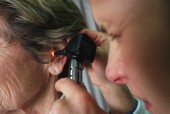- 8 Ways to Increase Dopamine Naturally
- 7 Best Breads for Maintaining Stable Blood Sugar
- Gelatin vs. Collagen: Which is Best for Skin, Nails, and Joints?
- The Long-Term Effects of Daily Turmeric Supplements on Liver Health
- Could Your Grocery Store Meat Be Causing Recurring UTIs?
- Are You Making This Expensive Thermostat Error This Winter?
- Recognizing the Signs of Hypothyroidism
- 10 Strategies to Overcome Insomnia
- Could Artificial Sweeteners Be Aging the Brain Faster?
- Techniques for Soothing Your Nervous System
Hearing Loss Tied to Faster Brain Shrinkage With Age


Older adults with impaired hearing may have a faster rate of brain shrinkage as they age, a new study suggests.
A number of studies have found that older people with hearing loss tend to have a quicker decline in their memory and thinking skills, compared to those with normal hearing.
“We’ve known that common, age-related hearing loss is associated with cognitive [mental] decline. The question is, why?” said Dr. Frank Lin, an assistant professor at Johns Hopkins University in Baltimore, and the lead researcher on the new study.
The findings, he said, offer one potential explanation: Older adults with hearing problems lose brain volume more quickly than their peers with normal hearing.
The precise reason is not clear, and the real-life impact is unknown. The study did not test participants’ actual mental ability.
But the “biggest question,” Lin said, is whether treating hearing impairment can slow changes in brain structure and, more importantly, delay dementia.
He and his colleagues are now planning a trial to test that idea.
The current findings are based on 126 adults aged 56 to 86 who underwent yearly MRI scans to track brain-tissue changes for up to a decade. At the time of the first scan, they also had a physical and a hearing test. Of participants, 51 showed some degree of hearing loss — mostly the mild variety where people have trouble hearing soft voices, for instance.
Lin’s team found that older adults with hearing problems showed a faster decline in brain volume over the years — especially in brain regions involved in processing sound and speech.
The study, published online Jan. 9 in the journal NeuroImage, cannot prove that hearing loss directly causes brain-tissue loss. But the basic “use it or lose it” principle may apply, according to Lin.
“The ear is no longer sending clear messages to the brain,” he said. Without that input, sound-processing brain regions may change in structure.
What’s more, Lin said, those brain areas have other jobs, too. Among other things, they play a role in memory and processing information other than sounds.
A hearing expert not involved in the study said it’s “interesting,” and raises the question of whether treating hearing impairment can prevent brain-tissue loss or slow mental decline.
“But we need a study to test that, and that study has yet to be done,” said Dr. Ian Storper, an otologist at Lenox Hill Hospital, in New York City.
Even though researchers have found a link between hearing loss and mental decline, Storper noted, “that doesn’t prove causation.” Both hearing loss and brain-volume loss are common parts of aging, and there are many other variables that may be related to both, Storper added.
Lin’s team did account for some other health factors — like whether people smoked, or had high blood pressure or diabetes. And there was still a connection between impaired hearing and greater brain-volume loss.
But Lin agreed that what’s ultimately needed is a trial testing whether hearing loss treatment slows mental decline.
“In the end,” Lin said, “what everyone cares about is, what can we do about it?”
There are, of course, already reasons to treat hearing loss, Storper said. In some cases, treatment can be as easy as removing impacted ear wax, he noted.
But often, older adults need a hearing aid or assistive devices that make it easier to hear in specific situations — while talking on the phone or watching TV, for example.
According to the U.S. National Institute on Aging, almost one-third of Americans aged 65 to 74 have at least mild hearing loss — as do nearly half of those aged 75 and older.
If impaired hearing is one contributor to mental decline and dementia, Lin said, then treating it could have a big impact on public health.
More information
The U.S. National Institutes on Aging has more about hearing impairment.
Source: HealthDay
Copyright © 2026 HealthDay. All rights reserved.










